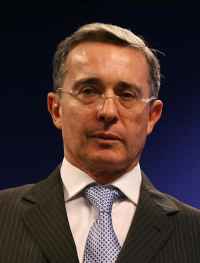Will Colombia's President Uribe Run Again? He Shouldn't
Latin American Current Events, News & Affairs - Andres Oppenheimer

President Uribe
When I interviewed Colombian President Alvaro Uribe last year and he refused to answer five questions on whether he would seek to change the constitution and run for a third consecutive term, I thought he was just playing games.
Uribe was trying to keep the media guessing in order not to become a lame duck, I thought.
But after the vote in the Colombian Senate to approve a referendum that is likely to allow Uribe to seek a constitutional change that would allow his reelection, many well-placed Colombians tell me they are convinced that Uribe is serious about running in 2010.
Are they right? Will Uribe, who is hugely popular and deserves credit for nearly defeating a narco-terrorist insurgency, follow the steps of Venezuelan President Hugo Chávez and other self-proclaimed "indispensable men" who eroded their countries' institutions in order to stay in power indefinitely?
There are several powerful reasons to believe so, even if the president remains mum.
First, it will become increasingly difficult for Uribe to tell his supporters that he will not run after they have spent considerable time and money -- at least $900,000, according to a Dec. 2, 2008 report in Colombia's Semana magazine -- to collect signatures for a referendum.
Second, Uribe has been strongly criticized by Colombian and international human rights groups in recent years for allegedly tolerating abuses in his battle against Marxist guerrillas.
The president may fear that if he leaves office he would face charges by victims of human rights abuses.
The recent conviction of former Peruvian President Alberto Fujimori on human rights charges could re-enforce such fears.
U.S. RESPONSE
Third, if Uribe ever wondered whether the United States -- which pays for much of Colombia's counterinsurgency effort -- would tolerate a third term that in the eyes of some U.S. legislators would put him in the ranks of Latin America's elected autocrats, he has already received a tacit indication from Secretary of State Hillary Clinton.
During her confirmation hearings, Clinton said in a Jan. 21 written response to Sen. Richard G. Lugar, R-Ind., about a possible third term by Uribe that "I do not believe it is proper for the United States to attempt to dictate the results of any internal democratic process in the region."
Mauricio de Vengoechea, a Miami-based political consultant who has worked for four presidential campaigns in Colombia, says that "there are just too many factors out there that suggest that Uribe will seek to run once again."
But there are also powerful reasons to believe that, in the end, Uribe will abstain from running.
This week's announcement by Defense Minister Juan Manuel Santos that he will step down this weekend to possibly start his presidential bid suggests that he knows that Uribe won't run.
Santos, a former foreign trade minister who led Uribe's successful fight against the guerrillas, told the Colombian daily El Tiempo on Tuesday that if Uribe runs, he won't, but added that he has the "hunch" that the president won't run.
In addition, growing numbers of Colombians oppose a third Uribe term.
They argue that Colombia would become, much like Venezuela, a country without the rule of law, where presidents can change the laws at their will.
Furthermore, they dismiss claims that Colombia would collapse without Uribe, arguing that whoever Uribe backs is likely to win.
POLARIZATION
Uribe may conclude that the political polarization triggered by a bid for a third term would make the country ungovernable.
Much like what happened with Fujimori, former Argentine President Carlos Menem and others who ran for third terms, he would fare badly. Why not go down in history as Colombia's best president in recent memory? he may ask himself.
My opinion:
If Uribe is keeping us guessing in order to remain at center stage while he finishes his second term, he may have been playing the game for too long.
Unless he stops this charade now and backs a candidate, his nondeclared re-election bid will have raised such high expectations -- and so much money -- among his followers that it will be very hard for him not to run.
That would be bad news.
Uribe would lose all moral authority to criticize Chávez and other elected autocrats who see themselves as "indispensable men" and who end up destroying their countries' institutions.
There is no such thing as a good dictator, and Uribe would not be an exception to the rule.
WORLD | AFRICA | ASIA | EUROPE | LATIN AMERICA | MIDDLE EAST | UNITED STATES | ECONOMICS | EDUCATION | ENVIRONMENT | FOREIGN POLICY | POLITICS
© Tribune Media Services